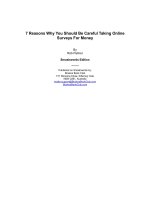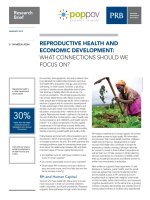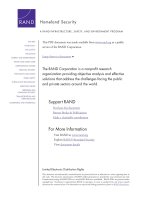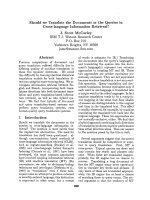Why should we care
Bạn đang xem bản rút gọn của tài liệu. Xem và tải ngay bản đầy đủ của tài liệu tại đây (246.4 KB, 41 trang )
2 Why should we care?
Many people think we shouldn’t. There is a widely held and
popular – but nonetheless misconceived – belief that any reduction
in the number of languages is a benefit for mankind, and not a
tragedy at all. Several strands of thought feed this belief. One
reflects the ancient tradition, expressed in several mythologies but
most famously in the Biblical story of Babel, that the proliferation
of languages in the world was a penalty imposed on humanity, the
reversal of which would restore some of its original perfectibility.
1
In an ideal world, according to this view, there would be just one
language, which would guarantee mutual understanding, enlight-
enment, and peace. Any circumstances which reduce the number
of languages in the world, thereby enabling us to move closer to
this goal, must therefore be welcomed.
There are two intractable difficulties with this view. The first is
the naivety of the conception that sharing a single language is a
guarantor of mutual understanding and peace, a world of new alli-
ances and global solidarity. The examples to the contrary are so
numerous that it would be impracticable to list them. Suffice it to
say that all the major monolingual countries of the world have had
their civil wars, and that as one reflects on the war-zones of the
world in the last decades of the twentieth century, it is striking just
how many of them are in countries which are predominantly
monolingual – Vietnam, Cambodia, Rwanda, and Burundi (the
latter two standing out in Africa in their lack of multilingualism).
It is, in short, a total myth that the sharing of a single language
27
1
See Eco (1995); for the comparative dimension, see Borst (1957–63).
brings peace, whichever language it might be. It is difficult to see
how the eventual arrival of English, Esperanto, or any other lan-
guage as a global lingua franca could eliminate the pride that leads
to ambition and conflict – any more than it did in the supposed
unilingual pre-Babelian era.
2
The second difficulty, of course, relates to this question of
choice. The people who are most vociferously in favour of a single
world language tend to come from major monolingual nations,
and make the assumption that, when the day arrives, it will be their
own language which, of course, everyone will use. Problems arise
when, for religious, nationalistic, or other reasons, the vote goes in
different directions, as it has always done. The oldest debate has as
its focus the nature of the imagined first language of mankind – a
debate which has generated centuries of pointless but hotly parti-
san speculation. According to Dante, in De vulgari eloquentia,
‘Hebrew was the language which the lips of the first speaker
formed.’
3
Dante could claim a great deal of support, but there have
been many who would disagree – such as the lady at the Versailles
court who said (according to Voltaire): ‘What a great shame that
the bother at the tower of Babel should have got language all mixed
up; but for that, everyone would always have spoken French.’
4
German, Egyptian, and Chinese have all had their supporters, as
have many other languages.
5
More recently, looking forwards
rather than backwards, there are those who expect a future single
world language to come through the intervention of an interna-
28
2
‘Supposed’, because Genesis 10 lists the sons of Japheth ‘according to their countries and
each of their languages’, and Babel did not take place until later. Eco (1995: 10) notices
this point, referring to it as ‘a chink in the armour of the myth of Babel’, and comments:
‘If languages were differentiated not as a punishment but simply as a result of a natural
process, why must the confusion of tongues constitute a curse at all?’ Note also the belief
that Iatiku, goddess of the Acoma tribe of New Mexico, is said to have caused people to
speak different languages so that they would find it less easy to quarrel. The underlying
truth here is the source of ironic comment in The hitch-hiker’s guide to the galaxy (Adams,
1979: ch. 6), which reports that the instantaneous translator of the future, called the Babel
fish, ‘by effectively removing all barriers to communication between different races and
cultures, has caused more and bloodier wars than anything else in the history of creation’.
3
Dante (c. 1304), part I, ch. 6.
4
Voltaire, Letter to Catherine the Great, 26 May 1767.
5
For other examples, see Crystal (1985: 48).
tional organization of some kind – though when we see the many
conflicts around the world which arise when people believe their
language is being sidelined (Quebec, Belgium, and India provide
instances which regularly reach the headlines), it is virtually
impossible to conceive of a situation in which an international
body could persuade people to voluntarily give up their language,
or support another at the expense of their own. The reasons for this
I shall discuss below.
None of this, it should be clear, has anything to do with the per-
ceived value of a language becoming a global lingua franca. Lingua
francas have an obvious and important role in facilitating interna-
tional communication; but even if one language does, through
some process of linguistic evolution, become the world’s lingua
franca – a status which most people feel is likely to be held by
English
6
– it does not follow that this must be at the expense of
other languages. A world in which everyone speaks at least two lan-
guages – their own ethnic language and an international lingua
franca – is perfectly possible, and (as I shall argue below) highly
desirable. Because the two languages have different purposes – one
for identity, the other for intelligibility – they do not have to be in
conflict. However, persuading individual governments to work
towards a bilingual (or multilingual) world is by no means easy,
not least because of the costs involved; and the history of individ-
ual language situations, invariably containing elements of colonial
exploitation, can be so full of emotion that conflict is at least as
common as concord.
Emotions regularly cloud the issues. People who are prepared to
grant that, on a global scale, language loss is a bad thing, can some-
times nonetheless be heard condemning a locally encountered lan-
guage, along with the culture of which it is a part. Frequently, this
is part of a history of ethnic conflict, or a cultural clash between
classes, as when suburban dwellers encounter a population of Rom
travellers. The fears may be real or imagined, and they will almost
Why should we care? 29
6
I review this case in Crystal (1997b); a more sceptical view of the long-term position of
English is Graddol (1997).
certainly be fed by a history of stereotyping; but the resulting con-
demnation is the same: most languages are fine, but their language
is ‘foul-mouthed’, ‘primitive’, and ‘little more than noise’, and ‘it
wouldn’t be a bad thing if it disappeared’. Facts come to be beside
the point in such situations – notably the fact (which I shall illus-
trate below) that there is no such thing as a primitive language, and
that every language is capable of great beauty and power of expres-
sion.
7
Fears and hatreds pay no attention to facts.
Sometimes it is reason which clouds the issues – a reason, that
is, which seems plausible when you first hear it, but which with
further thought turns out to be spurious. The most commonly
heard argument here is the economic one: having so many lan-
guages in the world is a waste of money, because individuals and
firms have to spend so much time and energy on translating and
interpreting. If there were just one language, so this argument goes,
everyone could get on with the job of buying and selling without
having to worry about these barriers. There is an element of truth
in this: it does indeed cost a lot of money to cope with the diversity
of the world’s languages. The fallacy is to think that it is money
wasted. Indeed, the view that foreign languages get in the way of
buying and selling has been frequently countered, in recent years,
by evidence from the business world itself, where knowledge of a
foreign language is so often seen to be a competitive advantage.
Given two British firms, trying to sell to the Arabic market, and one
is capable of using Arabic and the other is not – all else being equal,
which firm do you think will more impress the buyer? Languages,
it has been well said, are the lubricant of trade.
8
There are strong economic arguments available to counter the
30
7
For a classic statement on the misconceptions of primitiveness, see Hymes (1966: 74): ‘we
know no natural languages with vocabularies so limited that their speakers must eke them
out with gestures (and hence perhaps cannot communicate in the dark); which lack
definite systems of sounds and grammar; which lack standards of usage; which, because
of lack of system or of writing, change more rapidly in structure than other languages;
which lack abstract terms or capacity for forming them; which cannot serve significant
intellectual and aesthetic expression. We know, indeed, no demonstrated characteristics
which would place together the languages of “primitive” peoples as against those of “civ-
ilized” peoples.’ For a recent affirmation, see Dixon (1997: 65, 118). See further below.
8
Arcand (1996: 119).
‘many-languages-wasteful’ view.
9
For example, from the viewpoint
of ‘human capital theory’, language is part of the resources people
can draw upon in order to increase the value of their potential con-
tribution to productivity. A cost–benefit analysis of the conse-
quences of being multilingual would bring to light a wide range of
benefits for individuals, both financial and non-financial (e.g. in
terms of achieving wider horizons or wider social acceptance).
This would form part of a much broader economic perspective, in
which the traditional view, that the economy influences language,
is supplemented by the notion that language exercises a strong
influence on the economy. There are several domains in which lan-
guages play an important role, and thus contribute to their eco-
nomic success – such as tourism (with its emphasis on diversity),
the arts, and local manufacturing industries. Local languages are
seen to be valuable because they promote community cohesion
and vitality, foster pride in a culture, and give a community (and
thus a workforce) self-confidence. In just the same way as so much
of language shift has been shown to result from economic factors,
so these same factors can be used to foster language maintenance.
People it seems are willing to devote large sums of money to having
their identity promoted. It can, in short, pay you to be bilingual –
where the ‘you’ can be an individual, a business, or a government.
We shall return to the point below.
There is no plausibility in the view ‘the fewer languages the
better’, to my mind; the opposite view, however, has several strong
arguments. So, what are the benefits of maintaining as many of the
world’s languages as possible? The issues do need to be formally
laid out, for it has to be admitted that problems to do with language
– like many other domains which chiefly influence the quality of
life (such as speech therapy, or the arts) – do not make as immedi-
ate an impression on human consciousness as do the consequences
Why should we care? 31
9
Very little study has been devoted to what might be called the ‘economics’ or ‘market value’
of language; an exception is the 1996 issue of the International Journal of the Sociology of
Language on ‘Economic Approaches to Language and Language Planning’; see, especially
in relation to the point about ‘buying and selling’, the paper by Grin. See also Coulmas
(1992).
of, say, famine or disease. The loss of a language is not self-evi-
dently life-threatening. Nor has the language issue attracted the
public attention in the same way as has the issue of the environ-
ment.
10
Most adults know, and all children are taught, about such
matters as the need to conserve the world’s rainforests and its eco-
logical diversity. The green movement has been eminently success-
ful in raising the public consciousness and sense of urgency about
its biological heritage – in all domains except language. There has
been little public perception of the need for a ‘green linguistics’.
11
The arguments have only recently been marshalled, and have
received little publicity. It is high time for them to reach a wider
public. There are basically five of them, all answering in different
ways the question ‘Why should we care if a language dies?’
Because we need diversity
This is a direct extension of the ecological frame of reference: the
arguments which support the need for biological diversity also
apply to language. Most people, in fact, would accept without need
for argument the proposition that ecological diversity is a good
thing, and that its preservation should be fostered. But if we look
at the reasoning which underlies this view, we find two issues
which need to be made explicit if the application of ecological
thinking to language is to be clear. First, in relation to ecology: it is
not simply that an individual species is of interest or value in its
own right. The whole concept of the ecosystem is based on the
insight that living entities exist through a network of interrelation-
ships. To take just one definition: an ecosystem is ‘the system
32
10
The contrast in the public awareness of biological and of linguistic diversity has been
noted by several commentators: see Hale (1992a: 1), Krauss (1992: 7), and Rhydwen
(1998: 101–2). The hundreds of international and national organizations devoted to
botanical and zoological endangerment, some of which have passed their century (e.g.
the National Audubon Society, for the conservation of birds in the USA, was founded in
1866), contrasts strikingly with the tiny handful of linguistic organizations which began
to appear in the mid-1990s. See further below.
11
Notwithstanding the unconscious advertising of the matter by Chomsky (1957: 15)!
Within linguistics, the field of ecolinguistics has been steadily growing: see the review by
Fill (1998), Fill and Mülhäusler (2001), and p. 94 below.
formed by the interaction of all living organisms, plants, animals,
bacteria, etc. with the physical and chemical factors of their envi-
ronment’.
12
In a holistic conception, the cultural as well as the bio-
logical domains are brought into a mutually reinforcing
relationship: the distinctive feature of human ecology is accord-
ingly the attempt ‘to link the structure and organization of a
human community to interactions with its localized environ-
ment’.
13
And a major emphasis in this literature is that damage to
any one of the elements in an ecosystem can result in unforeseen
consequences for the system as a whole.
The second issue focuses on the notion of diversity, which also
has considerable relevance. The world is ‘incorrigibly plural’ (as
Louis MacNeice put it in ‘Snow’, 1935). Diversity has a central place
in evolutionary thought, where it is seen as the result of species
genetically adapting in order to survive in different environments:
‘Evolution depends on genetic diversity.’
14
Increasing uniformity
holds dangers for the long-term survival of a species. In the lan-
guage of ecology: the strongest ecosystems are those which are most
diverse. As one author has put it, ‘The diversity of living things is
apparently directly correlated with stability . . . variety may be a
necessity in the evolution of natural systems’.
15
And, in its applica-
tion to human development, the point has often been made that
our success in colonizing the planet has been due to our ability to
develop diverse cultures which suit all kinds of environments.
The need to maintain linguistic diversity stands squarely on the
shoulders of such arguments. If diversity is a prerequisite for suc-
cessful humanity, then the preservation of linguistic diversity is
essential, for language lies at the heart of what it means to be
Why should we care? 33
12
Kenneth Mellanby, entry on ‘ecosystem’ in Bullock, Stallybrass, and Trombley (1988:
253).
13
Peter Haggett, entry on ‘human ecology’ in Bullock, Stallybrass, and Trombley (1988:
248). The parallels between the way an ‘ideology of death’ is affecting both biosphere and
culture are drawn in Babe (1997). See, further, chapter 4 below.
14
Steve Jones, in Jones, Martin and Pilbeam (1992: 269). It should be noted that the genetic
analogy can take us only so far: there is no case for a Darwinian perspective, in which we
note dispassionately the survival of the linguistic fittest, because the factors which cause
the death of languages are, in principle, very largely under human control.
15
Odum (1986).
human. If the development of multiple cultures is so important,
then the role of languages becomes critical, for cultures are chiefly
transmitted through spoken and written languages. Accordingly,
when language transmission breaks down, through language
death, there is a serious loss of inherited knowledge: ‘Any reduc-
tion of language diversity diminishes the adaptational strength of
our species because it lowers the pool of knowledge from which we
can draw.’
16
For the individual speakers, it is a significant loss,
because their personal history has gone; but this loss has an indi-
rect effect on everyone (as I shall illustrate below). One field lin-
guist put it this way: ‘A native language is like a natural resource
which cannot be replaced once it is removed from the earth.’
17
Another commentator adopts a zoological parallel: ‘just as the
extinction of any animal species diminishes our world, so does the
extinction of any language’.
18
A third adopts a genetic analogy:
‘Language diversity, like a gene pool, is essential for our species to
thrive . . . If we are to prosper, we need the cross-fertilisation of
thought that multilingualism gives us.’
19
And a policy statement
issued by the Linguistic Society of America in 1994 goes a step
beyond analogy:
20
The loss to humankind of genetic diversity in the linguistic world
is . . . arguably greater than even the loss of genetic diversity in the
biological world, given that the structure of human language
represents a considerable testimony to human intellectual
achievement.
34
16
Bernard (1992: 82).
17
Romeo Labillos, in Maurais (1996: 269).
18
Hale (1992a: 8). The principle expressed by Hale and other contributors to that issue of
Language was attacked by Peter Ladefoged in a subsequent issue (Ladefoged 1992), chal-
lenging the assumption that different languages and cultures always ought to be pre-
served. His point was that, when political considerations are taken into account – as they
always must be – linguists are not best placed to make a value judgement about whether
a language should be preserved or not. There is an enormous distance between the axiom
of desirable diversity and its application in individual circumstances. This point is dis-
cussed further in chapter 4.
19
Pogson (1998: 4). An ecological perspective has been adopted by many linguists working
with endangered languages: see, for example, Wurm (1991: 2–4), and below, chapter 4,
fn. 6.
20
Committee on Endangered Languages and their Preservation (1994: 5). Peter Trudgill
(1991) makes the interesting point that languages as partial barriers to communication
are actually a good thing, ecologically speaking, because they make it more difficult for
dominant cultures to penetrate smaller ones; see also Trudgill (2000: ch. 9).
A notion such as ‘cross-fertilization of thought’ sounds very
simple; but it is far more than allowing oneself to be influenced by
the occasional foreign turn of phrase – as when English speakers
make use of such words as élan or chic. For bilingual (or multilin-
gual) individuals, there is the permanent availability of two (or
more) hugely different perspectives on large areas of life. And even
monolingual people are historically multilingual, in the sense that
their language will contain loan-words reflecting the history of its
contact with other cultures. English, for example, has borrowed
huge numbers of words from over several hundred languages, and
hundreds of languages have in turn borrowed huge numbers of
English words. That is what gives so much interest and variety to a
lexicon, of course – in the case of English, an Anglo-Saxon word
like kingly co-exists with a French word (royal) and a Latin word
(regal), thereby offering possibilities of nuance and style which
would not otherwise be available.
There is a second way in which a language contains our history.
Through the words and idioms it uses, it provides us with clues
about the earlier states of mind of its speakers, and about the kinds
of cultural contact they had. There are over 350 living languages
listed in the etymological files of the Oxford English Dictionary.
Each etymology demonstrates through its presence a point of
contact, an index of influence. Words become part of the evidence
of social history. George Steiner’s comment applies: ‘Everything
forgets. But not a language.’
21
With tens of thousands of words,
idioms, and metaphors in a language’s domestic vocabulary, and
large numbers of grammatical constructions available to manipu-
late these items, it is plain that the potential for linguistic interac-
tion, even between two languages, is immense. And with
thousands of languages in the ‘pool’, the capabilities of expression
stemming from the human language capacity are almost unimag-
inable. It is a richness of heritage whose power to facilitate individ-
ual expression, in the form of community or personal identity, is
virtually unlimited. Michael Krauss drives the point home:
22
Why should we care? 35
21
‘The hollow miracle’, in Steiner (1967: 131).
22
Krauss (1992: 8).
Surely, just as the extinction of any animal species diminishes our
world, so does the extinction of any language. Surely we linguists
know, and the general public can sense, that any language is a
supreme achievement of a uniquely human collective genius, as
divine and endless a mystery as a living organism. Should we
mourn the loss of Eyak or Ubykh any less than the loss of the
panda or California condor?
And Russian writer Vjaceslav Ivanov sums it up in this way:
23
Each language constitutes a certain model of the universe, a
semiotic system of understanding the world, and if we have 4,000
different ways to describe the world, this makes us rich. We
should be concerned about preserving languages just as we are
about ecology.
If there are 6,000 languages, of course (see p. 11), we are even
richer. And if, in a century’s time, as many have died as current
fears predict, we will have lost half our traditional cultural wealth,
and reduced our human expressive potential in proportion. (The
possibility that some of this wealth might eventually be replaced is
addressed in chapter 5.)
Because languages express identity
If we turn the concept of diversity over, we find identity. And every-
one cares about their identity. A Welsh proverb captures the
essence of this section’s answer to the question ‘Why should we
care if languages die?’:
Cenedl heb iaith, cenedl heb galon
‘A nation without a language is a nation without a heart’
Even monolingual speakers of thriving languages can develop a
sense of what it means to talk of endangered languages in terms of
identity. All they have to do is reflect on the role of dialect within
their community. I have never met anyone who, when presented
with the issue, has failed to regret the passing of old rural dialects
36
23
Ivanov (1992).
of British English, whether they are a member of a rural dialect
community or not. Those who are concerned about the matter
often form themselves into dialect societies, compiling lists of old
words, preserving old stories, and sometimes engaging in transla-
tions of major works into dialect – extracts from Shakespeare or
the Bible, for example.
24
Some of these bodies have been around a
long time. The Yorkshire Dialect Society celebrated its centenary in
1997.
Few people have captured the romanticism and nostalgia that
accompanies the dialect ethos better than Samuel Bamford, who
made a collection of south Lancashire dialect words and phrases in
1854:
25
There is . . . a pleasure in the contemplation, the remembrance, as
it were, through history, of old people who have left the place we
live in, who have quitted the ground we occupy, who have just, as
it were, gone out and shut the door of the house after them before
we got in. We wish to recal [sic] them; we would they had stayed a
little longer; that they had been there when we arrived. We go to
the door and look for them; up the street, down the lane, over the
meadow, by the wood; but the old folks are not to be seen high or
low, far or near; and we return to our room disappointed. We
picture to ourselves the pleasant time we should have had were
they beside us; how we should have seen the cut of their apparel,
their broad hats, and quaint lappels [sic], their ‘buckles and
shoon’; and heard their old tales and stories, and caught the tones
of their voice, and the accent of their uncouth words. But it
cannot be; they are gone, and there is no return: we have not seen
them, we never shall see them; and again we are saddened and
disappointed. A book, however, in the midst of our regret, attracts
our notice; we open it, and herein we find, not only the
portraiture of those we have been regretting, but their old stories,
their uncouth words, and almost the tones of their voice are
therein preserved for us. We sit down happy in the prize, and
enjoy the mental pleasure which it provides. Such a book would I
place on the shelf of the old house ere I depart.
The sentimentality of the writing is typical of the genre, and
doubtless there are those, accustomed to the harder tones of late
Why should we care? 37
24
As in Kellett (1996).
25
Bamford (1854: xi–xii).
twentieth-century discourse, who will find it unappealing. But the
emotion it expresses should not be mocked, for it is genuine
enough, and I quote it at length because it can help convey to those
who are unused to the concept of language death something of
the state of mind of those for whom that prospect is all too real.
Such strength of feeling, one might reflect – and all for ‘just’ an en-
dangered dialect! How much more emotion would one be justified
in expressing, therefore, if we were dealing with an endangered
language?
The word ‘just’ may be rhetorically appropriate, but it is of
course cognitively a nonsense. For dialects are just as complex as
languages in their sounds, grammar, vocabulary, and other fea-
tures. As we have already seen in chapter 1, the boundary between
dialect and language is arbitrary, dependent on sociopolitical con-
siderations that can transform a dialect into a language at the drop
of a bomb.
26
Dialect death is language death, albeit on a more local-
ized scale. So the yearning for continuity which that quotation
reflects will still be there, when it comes to considering the broader
issues of language death. In both cases, we are dealing with issues
of cultural distinctiveness, of a community’s character, insofar as
they are transmitted through language. These notions are inter-
twined. Character is the result of inheritance. As Thomas Mann
remarked: ‘We should know how to inherit, because inheriting is
culture.’
27
But to know what it is that we inherit, we need language.
Marianne Mithun, reflecting on work with North American
peoples, sums it up in this way:
28
The loss of languages is tragic precisely because they are not
interchangeable, precisely because they represent the distillation
of the thoughts and communication of a people over their entire
history.
That is why, she goes on, an approach to these languages which
tries to preserve them through translation only is misconceived:
38
26
The military allusion is apt, for a language has been famously defined as ‘a dialect with
an army and a navy’ (Weinreich, 1980). It is also apt for another reason: in so many
instances the reasons for language loss, as we shall see in chapter 3, are bound up with
military invasion. For a relevant dialectological study, see Holloway (1997).
27
Quoted in Henze (1982).
28
Mithun (1998: 189).
Language instruction and documentation that is limited to
translations of English words or even English sentences misses the
point entirely. It must capture not just how things are said, but
also what people choose to say, not only in ceremonies and
narrative, but in daily conversation as well.
Oliver Wendell Holmes captures the linguistic side to community
character in a typically figurative expression: ‘Every language is a
temple, in which the soul of those who speak it is enshrined.’
29
It is
a fine metaphor, though a somewhat passive one. It underplays the
dynamic role which everyone has as active participants in their
culture. We make culture, as well as receive it. A more appropriate
analogy, accordingly, is to talk about cultural identity in terms of
the self-expression of a people, however this is manifested. Rituals,
music, painting, crafts, and other forms of behaviour all play their
part; but language plays the largest part of all. Some would go
much further: ‘Language . . . is not only an element of culture itself;
it is the basis for all cultural activities’.
30
Although there are prob-
lems with ‘all’, as we shall see in chapter 4, those who work with
endangered languages readily recognize the thrust of this point, for
they see, day by day, the way a community is heavily dependent on
language for communicating and interpreting its behaviour. ‘What
do you think?’ ‘What are they doing?’ ‘Why did she do that?’ ‘Who
is that person?’ These are not only the questions of outside analysts
trying to make sense of their observations. They are questions
which the members of a community ask of each other. Ultimately,
to make sense of a community’s identity, we need to look at its
language.
Identity is what makes the members of a community recogniz-
ably the same. It is a summation of the characteristics which make it
what it is and not something else – of ‘us’ vs ‘them’. These charac-
Why should we care? 39
29
Holmes (1860: ch. 2).
30
Bloch and Trager (1942: 5). We must be careful not to overstate this position. To antici-
pate the argument of chapter 4: the view that ‘people cannot save their culture without
their language’ is one such overstatement, given that so many communities demonstrate
a living ethnicity despite the fact that most of its members have lost or never learned the
language. One of the most heated controversies in contemporary Wales, for example, is
whether one can be Welsh if one does not speak Welsh; and there are arguments on both
sides. The general issue needs research: which aspects of culture, exactly, are dependent
on language for their preservation and which are not?
teristics may be to do with physical appearance, but just as often
(especially in these increasingly heterogeneous days, when it can be
difficult to tell what community people belong to just by looking at
their faces) they relate to local customs (such as dress), beliefs,
rituals, and the whole panoply of personal behaviours. And of all
behaviours, language is the most ubiquitous. It is available even
when we cannot see other people (shouting at a distance) or see
anything at all (talking in the dark). Language is the primary index,
or symbol, or register of identity. I search for the best metaphor, as
have others before me. ‘A language is the emblem of its speakers’,
says Dixon.
31
‘Language is a skin’, says Barthes, ‘I rub my language
against another language.’
32
Emerson gives us a fine image:
33
We infer the spirit of the nation in great measure from the
language, which is a sort of monument to which each forcible
individual in a course of many hundred years has contributed a
stone.
In the case of the literary classics, the stones are massive indeed.
And this historical slant is echoed by Edward Sapir:
34
Language is the most massive and inclusive art we know, a
mountainous and anonymous work of unconscious generations.
Identity, then, brings us inexorably into contact with history,
which provides us with another way of answering the question
‘Why should we care about language death?’
Because languages are repositories of history
On his tour of Scotland with James Boswell, Dr Johnson produced
one of the remarks for which he is justly famous:
35
Alas! sir, what can a nation that has not letters [=writing] tell of
its original? I have always difficulty to be patient when I hear
authors gravely quoted, as giving accounts of savage nations,
40
31
Dixon (1997: 135).
32
Barthes (1977).
33
In ‘Nominalist and realist’ (Emerson 1844).
34
Sapir (1921: 220).
35
In Boswell (1785): the day is 18 September 1773. ‘M’Craas’ is the name of one of the
Scottish clans.
which accounts they had from the savages themselves. What can
the M’Craas tell about themselves a thousand years ago? There is
no tracing the connection of ancient languages, but by language;
and therefore I am always sorry when any language is lost,
because languages are the pedigree of nations.
Some of his vocabulary is unpalatable nowadays, but his final
observation is unassailable. Languages as the pedigree of nations.
Pedigree, then as now, refers to ancestry, lineage, or descent.
Johnson is thinking like a philologist, when he talks about a lan-
guage’s ‘original’. But languages, once they are written down, tell us
more than their philological connections. A language encapsulates
its speakers’ history. ‘Language is the archives of history’, said
Emerson.
36
It does this, most obviously, by expressing, through the
grammar and lexicon of its texts, the events which form its past.
37
Even the most casual glance at the reference section of any library
conveys the extent to which people are reliant on written language
for a full sense of their origins and development, as a nation. The
literature section makes the point just as strongly. And, as individ-
uals, we value highly those linguistic scraps of personal documen-
tationwhichhavecomedowntousfromourancestors–a
grandparent’s diary, the name scribbled on the back of a photo-
graph, the entries in parish registers and gravestone inscriptions –
all of which provide evidence of our own pedigree. We value the
right to have this information ourselves; we take pride in it, and find
in it a source of great pleasure and inspiration. Might we not, then,
justifiably feel concerned to hear that others will not have access to
this right? The desire to know about our ancestry is a universal
inclination – but it takes a language to satisfy it. And, once a lan-
guage is lost, the links with our past are gone. We are, in effect,
alone.
Johan Van Hoorde seems to be making a similar point, in his
comment: ‘When you lose your language, . . . you exclude yourself
from your past’.
38
But he is speaking as the project manager for
Why should we care? 41
36
In ‘The poet’ (Emerson 1844).
37
The links between word history and social history are well explored in Hughes (1988);
see, for example, the history of culinary vocabulary on his p. 22.
38
Van Hoorde (1998: 8).
Nederlandse Taalunie, and the context of his thinking is Dutch, a
language which has been written down for centuries. The issue is
therefore rather different. From Johnson we can sense the need to
begin a period of linguistic continuity. From Van Hoorde, we can
sense what happens when we end one: a new generation finds itself
unable to reach into its history without special (philological) help.
In this case, the texts are there, but inaccessible to the ordinary
person. For mother-tongue English speakers, the nearest we can
get to the ‘feel’ of this situation is with Old English: walk round a
museum displaying Anglo-Saxon remains, and there is an artefac-
tual continuity with the present-day which we can recognize; but
encounter an Anglo-Saxon manuscript, and the language barrier is
almost total. Anyone who feels that the language is denying them
access to their legitimate history is right; but at 1,000 years’remove,
the engaging of emotions tends to be more cerebral than heartfelt.
By contrast, when we are unable to understand the letters of a dead
grandfather or grandmother, because we no longer share a lan-
guage with them, the poignancy can be inexpressible.
And if your language has never been written down? Johnson
radically underestimates the abilities of oral performers. What can
they tell about 1,000 years ago? A great deal, as we now know from
studies of oral traditions.
39
Mamadou Kouyaté, a West African
griot (oral performer) expresses it vividly:
40
We are vessels of speech, we are the repositories which harbour
secrets many centuries old . . . We are the memory of mankind; by
the spoken word we bring to life the deeds and exploits of kings
for younger generations.
It is easy to think that such claims are flights of fancy; but they are
not. Oral performers use sophisticated linguistic techniques to
ensure the transmission of this memory. We ought not to be sur-
prised. We are used to seeing prodigious feats of memory in, for
42
39
See, for example, Lord (1960) on the oral songs of Yugoslav epic singers; Swann (1992),
for a wide range of Amerindian illustrations; and, for a general review of the oral perfor-
mance field, Edwards and Sienkewicz (1990).
40
In Edwards and Sienkewicz (1990: 15).









